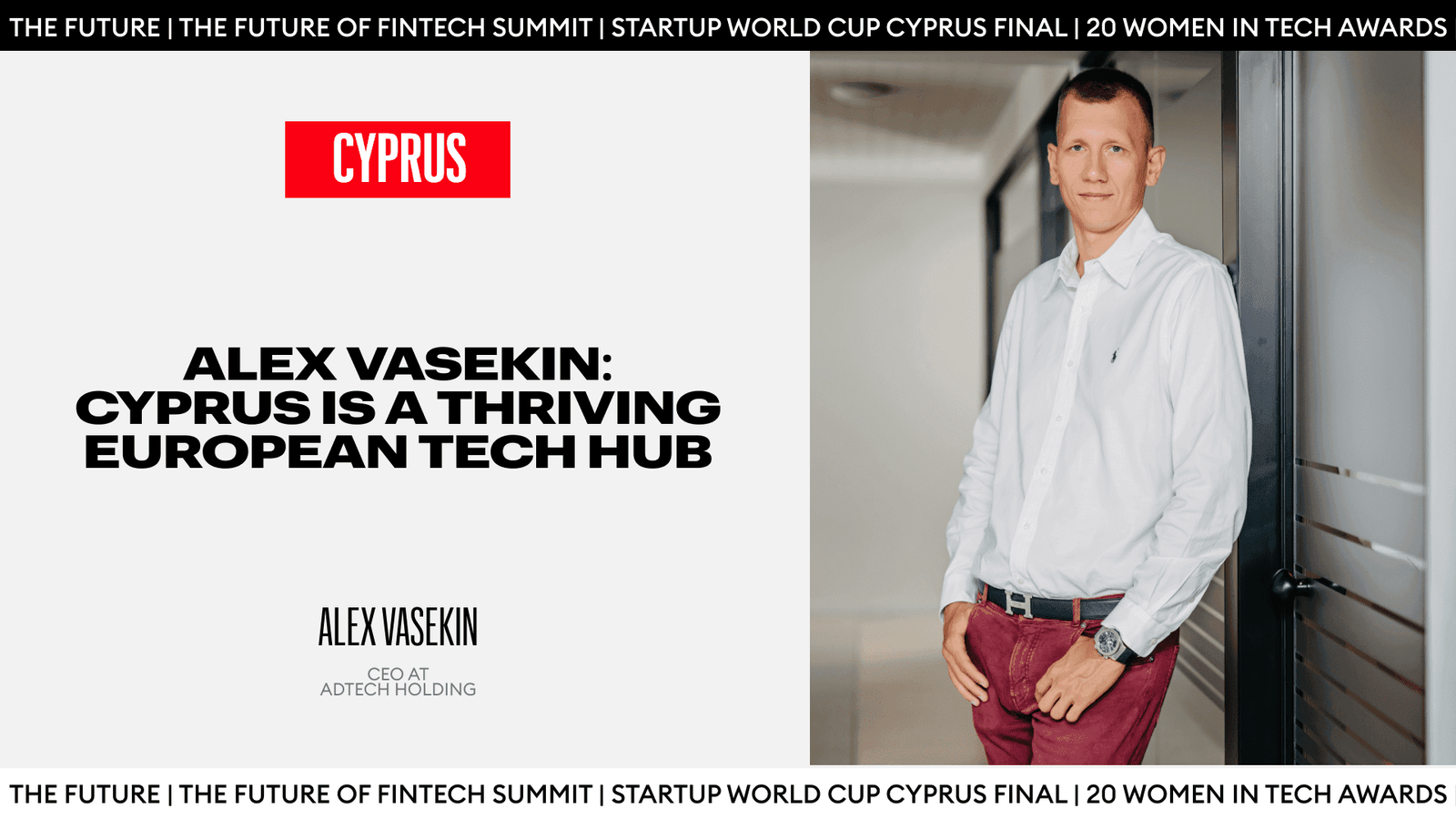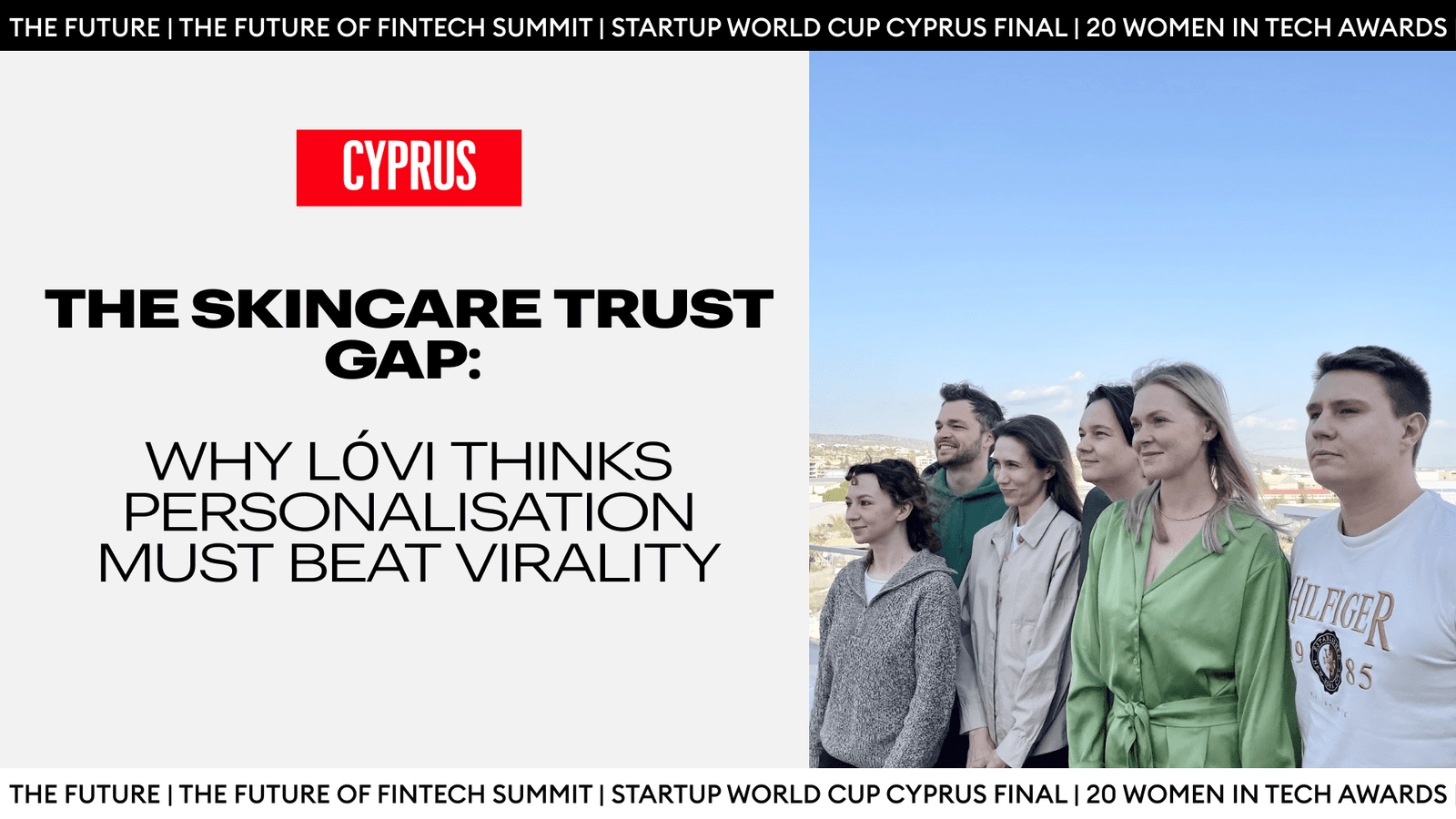Cyprus is rapidly positioning itself as a promising European tech and startup hub. With strategic government support, favourable tax policies, and an expanding talent pool, the island draws attention from entrepreneurs and investors alike. Alex Vasekin, CEO of AdTech Holding, is actively contributing to this transformation by supporting local startups and fostering an environment for innovation. In this interview, Vasekin shares his insights into the strengths and challenges of Cyprus’s startup ecosystem.
Among other initiatives, AdTech Holding plays a key role by organising events like HackTech, which brings developers, entrepreneurs, and investors together. These events help startups connect with mentors, refine their ideas, and gain visibility among potential investors. The CEO of AdTech Holding emphasises HackTech’s role in helping young entrepreneurs and creating a collaborative community where ideas can flourish.
Follow THE FUTURE on LinkedIn, Facebook, Instagram, X and Telegram
Looking forward, Vasekin envisions Cyprus as a significant player in the European tech landscape. His long-term vision is for the island to attract both local and international talent, supported by an investor-friendly and innovation-driven ecosystem.
Through continued collaboration, events, and international connections, Vasekin believes Cyprus can grow into a vital hub for technology and startup activity in Europe.
Let’s dive deep into our conversation.
How do you see the startup ecosystem evolving in Cyprus over the next few years? What key factors are contributing to the island’s transformation into an IT hub?
Cyprus is quickly establishing itself as a burgeoning tech and innovation hub, especially given its strategic position at the crossroads of Europe, Africa, and Asia. Over the next few years, I believe the startup ecosystem will continue its upward trajectory, largely fueled by government incentives, a growing talent pool, and an increasing influx of foreign investments. This momentum is already evident with Cypriot cities like Limassol, Nicosia, and Larnaca improving their global rankings in startup ecosystem performance. The government’s push for digital innovation, coupled with tech initiatives such as the formation of the TechIsland Association, reflects the nation’s commitment to nurturing an entrepreneurial environment.
A key driver in this transformation is the increasing availability of capital for startups, particularly for early-stage ventures. This trend mirrors broader European patterns, where funding for tech innovation has been steadily rising, despite the challenges European startups often face in scaling internationally. As Cyprus continues to offer a competitive, investor-friendly environment, its role as a regional IT hub will become more pronounced, attracting startups from neighbouring regions as well as Europe.
What advantages does Cyprus offer to tech startups compared to other European countries?
Cyprus offers a unique set of advantages for tech startups when compared to other European countries. Moreover, the island has established favourable tax conditions specifically for innovative companies engaged in developing unique technologies, like ours. This creates an appealing environment for tech firms looking to maximise their resources and grow.
In contrast to other European countries, Cyprus also presents a more accessible regulatory environment, which is particularly important for young ventures. Cyprus offers a unified and relatively streamlined approach, making it easier for startups to scale quickly without the complexities that can arise in other regions.
How is AdTech Holding contributing to the growth of the startup scene in Cyprus?
At AdTech Holding, we believe in fostering an ecosystem where innovation can thrive. Our company plays an active role in supporting the local tech community through various initiatives. We collaborate with local institutions and international organisations to organise tech events, such as HackTech, which brings together developers, entrepreneurs, and investors. These events not only serve as a platform for knowledge sharing but also help create opportunities for collaboration and growth. By organising and supporting these initiatives, we aim to contribute to positioning Cyprus as a tech hub where both local and international startups can flourish.
Can you share examples of how the company supports young entrepreneurs and startups, either through mentorship, funding, or other resources?
At AdTech Holding, one of our most impactful contributions to the startup ecosystem is organising HackTech, a major annual event designed to give young professionals and startups the platform they need to shine. HackTech offers participants the chance to present their ideas, refine their pitching skills, and face the real-world challenge of demonstrating the value of their projects to potential investors. It’s not just a competition but a learning experience where participants have the opportunity to “fail fast,” iterate on their ideas, and build resilience.
What makes HackTech particularly valuable for startups is the direct access to mentors. These industry professionals serve as a critical resource, guiding on both technical and business fronts. For many young entrepreneurs, mentorship is often more valuable than funding in the early stages, and HackTech provides a nurturing environment for building those long-term connections.
By creating a space for collaboration and learning, we help startups not only showcase their innovations but also navigate the complexities of scaling a business, thus positioning themselves for long-term success.
What are some of the main challenges that startups in Cyprus face, and how do you believe they can be overcome?
Startups in Cyprus face several key challenges, with access to funding being at the top of the list. Despite the growth in local startup initiatives, the availability of venture capital is still relatively limited compared to larger European ecosystems. Many entrepreneurs are forced to look outside the island for substantial investment opportunities, which can slow down their growth. Moreover, Cyprus, like much of Europe, has historically been more conservative in late-stage funding compared to the U.S., meaning that even when startups do secure initial funding, scaling can remain a bottleneck.
Another challenge is talent acquisition. While Cyprus has a strong education system and many skilled graduates, the tech talent pool is not as vast as in larger European cities. That said, remote work trends have somewhat mitigated this challenge, enabling Cypriot startups to tap into a global workforce.
To overcome these hurdles, I believe more collaboration between local institutions, increased government initiatives, and stronger connections to international markets will be key. Also, cultivating partnerships with VCs in more mature ecosystems will help Cypriot startups gain the exposure and capital they need to grow.
How do you think events like HackTech can help in addressing these challenges?
HackTech is a crucial platform for addressing many of the challenges that startups in Cyprus face. By bringing together local and international talent, it helps startups overcome the talent scarcity issue and introduces new perspectives and ideas to the community. These events shape a collaborative environment where participants can not only hone their technical skills but also gain invaluable business acumen through mentorship sessions and workshops.
Moreover, HackTech offers a vital networking opportunity, connecting startups with potential investors and partners from across Europe and beyond. By putting startups in direct contact with venture capitalists and industry leaders, the event bridges the funding gap that many local businesses face. The exposure startups gain at HackTech also helps them build the international connections that are so vital for scaling beyond Cyprus, an essential factor in turning the island into a competitive startup hub
What are the main objectives of this year’s Hackathon?
This year’s hackathon is focused on driving innovation in personal sustainability and community transformation, two areas that are critical for the future. We are encouraging participants to think about how technology can address personal challenges or act as a driver for vital problem solutions here on the island. By focusing on real-world applications of technology, we aim to not only boost the startup ecosystem but also create something that has a lasting, positive impact on society.
How do you integrate the Hackathon into the larger vision of positioning Cyprus as an IT hub?
HackTech is not just an isolated event; it is a part of Cyprus itself as a leading IT and innovation hub. By attracting talent from both the island and abroad, HackTech helps showcase Cyprus as a place where great ideas are born and nurtured. The event brings visibility to the local tech scene and encourages international investors and tech companies to consider Cyprus as a serious contender in the global tech ecosystem.
Moreover, HackTech aligns perfectly with the government’s efforts to promote Cyprus as a destination for tech innovation. Over time, we hope that HackTech will be one of the pillars that solidifies Cyprus’ reputation as a thriving IT hub, drawing both startups and established companies to set up operations here
What types of innovation and tech solutions are you hoping to see come out of this year’s event?
This year’s HackTech is centred around two major innovation streams.
First, we are encouraging participants to develop solutions that improve the quality of life for individuals. This can range from educational and health-tech tools that empower personal well-being to lifestyle apps that simplify daily tasks. By focusing on how technology can directly enhance individual lives, we aim to tap into projects that are both highly impactful and scalable, addressing real-world needs with digital solutions.
The second stream emphasises social impact, specifically how technology can solve important challenges facing the island. Participants will be tasked with creating solutions that tackle critical social issues using digital tools, whether in healthcare, or sustainability. These projects are particularly exciting as they hold the potential to not only improve life on the island but also serve as models that could be adapted in other regions.
Our goal is to see HackTech become a launching pad for innovative ideas that benefit both individuals and communities at large.
What message do you have for aspiring entrepreneurs or developers who are thinking of joining HackTech?
My message to aspiring entrepreneurs and developers is simple: seize the opportunity. HackTech is more than just a competition — it’s a platform for growth. Whether you come with a fully formed idea or are simply looking for inspiration, the connections you make and the experience you gain can be transformative. This is your chance to collaborate with some of the brightest minds, get direct feedback from industry leaders, and potentially take the first step toward launching your own business.
What is your long-term vision for Cyprus as a European tech and startup hub? How can both local and international talent contribute to this?
My long-term vision for Cyprus is to see it firmly established as a major tech and startup hub in Europe. Cyprus has all the ingredients to succeed: a favourable business environment, a skilled workforce, and growing international connections.
However, to fully realise this potential, we need to continue attracting both local and international talent. Local talent brings a deep understanding of the region and its needs, while international professionals provide diverse perspectives and expertise.
As remote work continues to become more prevalent, Cyprus can position itself as an ideal location for tech startups and established companies looking for a strategic base in Europe.














